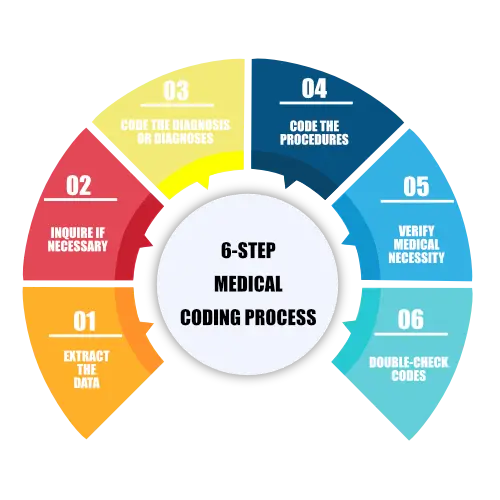Coding Services
Navigate the Intricacies of Healthcare Coding
Accurate coding is critical for the financial health of healthcare organizations, as it ensures that claims are processed correctly and reimbursed promptly by insurance providers

Why choose our medical coders?
Reduce Overhead
Save up to 70% on employment expenses. Top-notch medical coding at a fraction of the cost.
Foster Business Growth
Navigate medical coding demands with our experienced and certified coders.
Increase Efficiencies
Focus on your core tasks while our team maximizes your coding efficiencies.
Healthcare Medical Coding Process
Healthcare coding is the process of assigning alphanumeric codes to medical diagnoses, procedures, and services, which is used for billing purposes. Accurate coding is critical for the financial health of healthcare organizations, as it ensures that claims are processed correctly and reimbursed promptly by insurance providers. Additionally, coding plays a crucial role in tracking patient outcomes, supporting medical research, and ensuring regulatory compliance.
To ensure accurate coding, there are several regulations and documentation requirements that healthcare organizations must follow. These include:
- International Classification of Diseases (ICD) - ICD is a standardized system of codes used to classify and code diagnoses and procedures. The ICD is revised periodically, and healthcare organizations must stay up-to-date with the latest version to ensure accurate coding.
- Current Procedural Terminology (CPT) - CPT is a coding system developed by the American Medical Association (AMA) that is used to report medical procedures and services. CPT codes are updated annually, and healthcare organizations must keep up with these changes to ensure accurate billing.
- Healthcare Common Procedure Coding System (HCPCS) - HCPCS is a coding system used to report healthcare services and supplies. HCPCS codes are used by Medicare, Medicaid, and other insurance providers to determine reimbursement rates.
- Electronic Health Records (EHRs) - EHRs are digital records of patient health information, including medical history, test results, and treatment plans. Healthcare organizations must maintain accurate and complete EHRs to support coding and billing activities.
- HIPAA Privacy and Security Rules - The Health Insurance Portability and Accountability Act (HIPAA) establishes rules for the privacy and security of patient health information. Healthcare organizations must comply with HIPAA regulations to protect patient privacy and prevent data breaches.
